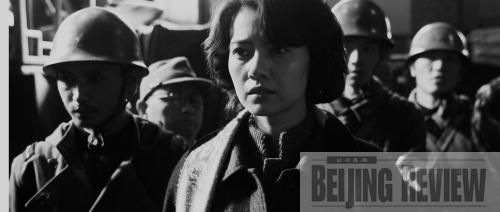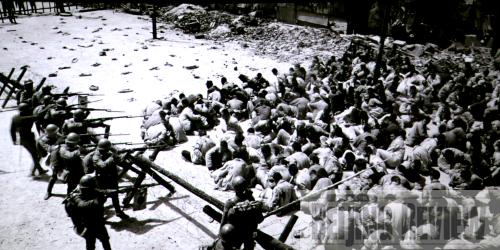|
 |
 |
|
Gao Yuanyuan plays the role of Chinese teacher Jiang Shuyun |
 |
|
A scene from the movie showing the slaughter of Chinese by the Japanese army |
The Nanjing Massacre still weighs heavy on the Chinese psyche. Now 72 years after the Japanese army murdered 300,000 souls and left a nation shell shocked, a new movie on this dark period of history has once again opened old wounds. It has also triggered a new wave of discussion on the aggressive war waged by Japan against China.
Called City of Life and Death, the movie presents the brave resistance of Chinese soldiers and the unyielding spirit of ordinary citizens of Nanjing, the former Chinese capital. Filmed in black and white documentary style, the movie shows the inner struggle of a Japanese soldier transforming from an innocent youth with a passion for life, into a killer on the battlefield and then to a person who commits suicide after reflecting on the horrors of war. This brings a new perspective to the war and explores the humanness of events.
The movie drew much attention from the public and has been a hit since it premiered in China on April 22. The movie's mainland box office takings had topped 160 million yuan ($21 million) by May 22, and 4 million people had seen it, said the China Film Group Corp., the co-producer of the film. Production and promotion costs, meanwhile, reached almost 100 million yuan ($14.7 million). From May 5, the movie has been screened in Hong Kong.
Tan Hong, President of Stellar Media Co. Ltd., and also a co-producer of City of Life and Death, told reporters in Hong Kong that currently the producers of the movie are discussing its release in other countries.
"The strong box office performance of the movie in China boosts the confidence of overseas distributors, and they are contacting us constantly. We hope the movie will be screened in many countries worldwide, including Japan," said Tan.
Tan also said that the producers of the movie plan to donate part of the box office income to the Memorial Hall of the Victims of the Nanjing Massacre by Japanese Invaders.
Much debate
Besides box office takings, what is more important for the movie is the flood of comments and reviews that result in deeper thought among the Chinese on history, war and peace.
The movie does not simply focus on disclosing how cruel the invaders were, but tries to explore the effect of a war on ordinary people, both victors and victims. In the movie, a Japanese soldier takes his own life after releasing two Chinese.
This is the first time in China that the resistance war against Japanese invasion from 1937 to 1945 has been told from this perspective. The new angle aroused doubt from many Chinese about the authenticity of the plot.
Some Chinese audiences left their comments online, saying that this plot seems to glorify the invaders.
Director Lu Chuan explained in an article on popular website sina.com that he believes there are always those people who pursue truth and justice in war. He portrays a Japanese soldier as an ordinary person because it is more fearful that an ordinary person would do something so inhuman.
"The mental breakdown of the Japanese soldier was the result of a war enforced on an ordinary person," the 38-year-old director said.
Wang Weixing, Deputy Director of the Institute of History under the Jiangsu Academy of Social Sciences, supports Lu's opinion. As one of the experts invited to be a consultant on the movie, Wang was in charge of the historical aspects. He told Dalian-based Peninsular Morning Daily that during the Nanjing Massacre, there were indeed some Japanese soldiers committing suicide.
"The war distorted their humanity. No matter whether the movie is evolved from the perspective of Chinese or Japanese, human sympathy was at the core of the movie." Wang said.
The destiny of "comfort women," or those local women who were used as sex slaves by the Japanese army, was also reflected in the movie. It is the first time in China that a movie has broached this topic. Lu said that all the screen time given to this subject was based on a great deal of historical research and evidence.
Being objective and calm when shooting the movie was a requirement that Lu set for himself. He said he wanted the calmness to flow to the audience, despite the traumatic subject matter.
The movie impressed Chinese audiences, despite the fact that they already knew the history of that period from school textbooks, other movies or previous literary works.
Zhang Zhe, 25, who works at a construction company in Beijing, told Beijing Review that he felt heaviness and oppression in his heart after watching the film. "I think more young Chinese should go to watch the movie, and the history should not be ignored or forgotten," he said, adding that the spirit shown by those Chinese who resisted bravely for the dignity of the nation should be learned by young people today.
Why make it?
On many occasions, Director Lu stressed that he wants to restore the true face of the Chinese during the war through the movie. He said that many historical materials that he had read showed that Chinese people had bravely resisted the Japanese invasion in Nanjing, including fierce street fighting. The plot of the resistance of a Chinese officer named Lu Jianxiong (played by famous actor Liu Ye) was based on such historical records.
| 